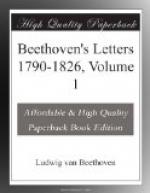LUDWIG VAN BEETHOVEN.
[Footnote 1: The A major Symphony and Wellington’s Victory at Vittoria were performed.]
[Footnote 2: “Obsolete” is written in pencil by Beethoven.]
117.
TO THE ARCHDUKE RUDOLPH.[1]
1814.
I beg you will send me the score of the “Final Chorus"[2] for half a day, as the theatrical score is so badly written.
[K.]
[Footnote 1: The spring of 1814.]
[Footnote 2: The Schlusschor, the score of which Beethoven requests the Archduke to send him, is in all probability the Finale Germania! Germania! intended for Treitschke’s Operetta Die gute Nachricht, which refers to the taking of Paris by the Allies, and was performed for the first time at Vienna in the Kaernthnerthor Theatre on the 11th April, 1814. The same Final Chorus was substituted for another of Beethoven’s (Es ist vollbracht) in Treitschke’s Operetta Die Ehrenpforten, first given on the 15th July, 1815, in the Kaernthnerthor Theatre. Both these choruses are printed in score in Breitkopf & Haertel’s edition of Beethoven’s works.]
118.
TO THE ARCHDUKE RUDOLPH.
1814.
Having only so recently received the score of the “Final Chorus,” I must ask you to excuse your getting it back so late. The best thing H.R.H. can do is to have it transcribed, for in its present form the score is of no use. I would have brought it myself, but I have been laid up with a cold since last Sunday, which is most severe, and obliges me to be very careful, being so much indisposed. I never feel greater satisfaction than when Y.R.H. derives any pleasure through me. I hope very soon to be able to wait on you myself, and in the mean time I pray that you will keep me in remembrance.




